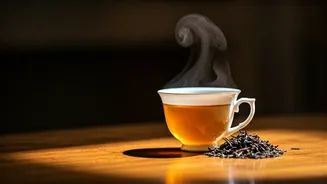Tea's Temptation
Tea, a beloved beverage worldwide, often becomes a staple in daily routines. However, the habit of drinking multiple cups a day, as exemplified by Raghav
Chadha's consumption of '8-10 cups' when campaigning, can lead to various physical effects. While tea offers some benefits, such as antioxidants, excessive intake can pose problems. The stimulating effects of caffeine, prevalent in tea, can disrupt sleep patterns and cause anxiety. The tannins in tea can interfere with iron absorption, especially during meals. Considering the impact of tea consumption necessitates a mindful approach to how much we drink and when. Making informed choices about our tea habits is crucial for maintaining good health and energy levels.
Caffeine's Consequences
The caffeine content in tea is a significant factor in understanding its impact. This stimulant provides the alertness many tea drinkers crave, but it can also lead to issues. Large doses of caffeine can trigger insomnia and restlessness. The body's response to caffeine varies among individuals, with some being more sensitive than others. Those already prone to anxiety might experience exacerbated symptoms. Consuming tea close to bedtime can make it difficult to fall asleep. Therefore, carefully monitoring the quantity and timing of tea intake becomes essential. Considering the long-term implications of elevated caffeine levels helps in making smarter choices about tea consumption, balancing its enjoyment with the body's needs.
Tannins and Absorption
Beyond caffeine, the tannins present in tea present another concern. Tannins, which give tea its distinct flavor and color, can hinder the absorption of iron from food. This is particularly problematic for individuals with iron deficiencies. When tea is consumed with meals, tannins can bind to iron, making it unavailable for absorption. To mitigate this effect, it's advisable to drink tea between meals, allowing the body to absorb iron more effectively. This strategic timing can help those who enjoy tea regularly without jeopardizing their iron levels. Addressing these nutritional considerations ensures that tea consumption complements a balanced diet, promoting overall wellness and preventing potential health problems.
Smart Substitution Ideas
Reducing tea consumption doesn't mean giving it up entirely; it means finding ways to enjoy it in moderation. One approach is to substitute some tea servings with healthier alternatives. Herbal teas, which are often caffeine-free, provide a flavorful and beneficial option. Water, infused with fruits or herbs, is another excellent choice, offering hydration without stimulants. Another strategy is to gradually decrease the amount of tea consumed per serving. Switching from a large mug to a smaller cup can also help reduce overall intake. By implementing these strategies, individuals can create sustainable habits and avoid the negative effects associated with overconsumption. The goal is to find a balance where one's love for tea aligns with their health objectives.
Gradual Intake Reduction
Implementing a gradual reduction plan can make it easier to cut back on tea. Instead of abruptly eliminating cups, start by cutting down by one cup each day or week. This allows the body to adjust to the lower caffeine levels without experiencing withdrawal symptoms like headaches or fatigue. If you typically drink six cups, begin by reducing to five, then four, and so on. This step-by-step approach gives your body time to adapt, making the process smoother and more manageable. Pairing this reduction with the alternatives mentioned earlier makes it an even simpler process to change. This gradual shift makes the reduction sustainable and ensures you do not feel deprived while enjoying tea as part of your routine.
Mindful Tea Consumption
Practicing mindfulness when drinking tea can also assist in moderating intake. Pay attention to how the tea makes you feel. Are you truly thirsty, or is it a habit? By becoming more aware of your body's signals, you can discern when you need a cup of tea. Enjoy the moment of having tea, savoring its flavor and aroma. When you drink tea, do it intentionally rather than as a mindless habit. This approach helps in regulating consumption and increases your overall enjoyment. Taking the time to observe your habits allows you to make informed decisions about how tea fits into your life. With this knowledge, you can enhance both your health and your daily experiences.




















